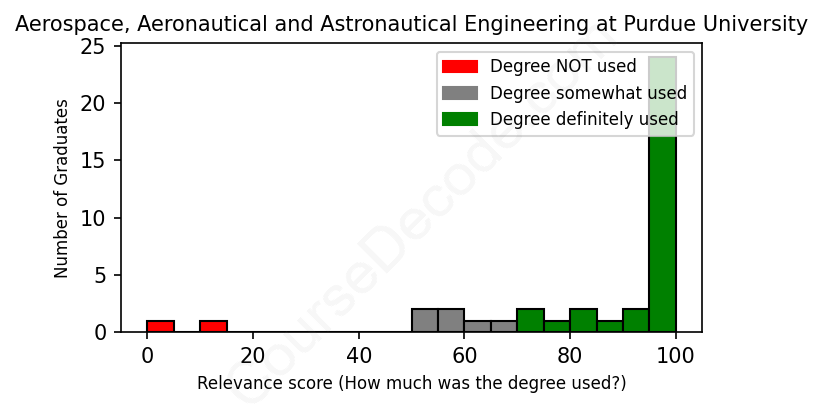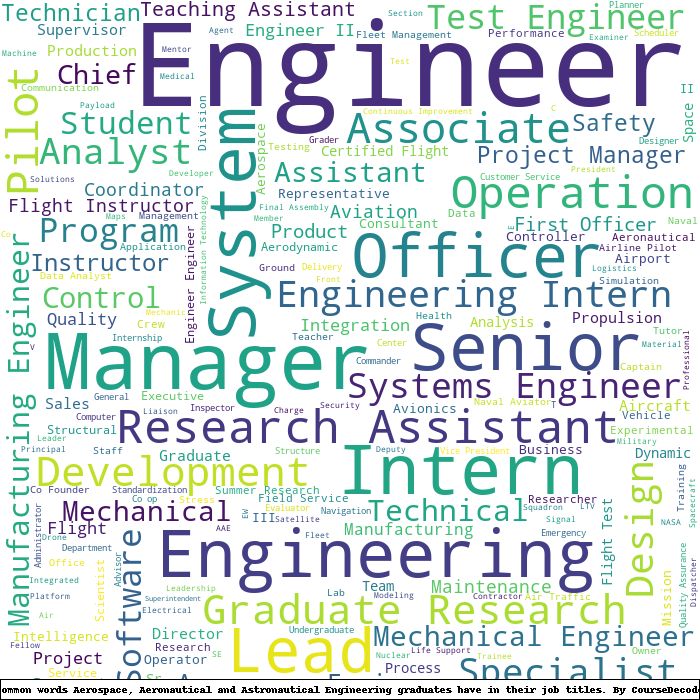
First, some facts. Of the Aerospace, Aeronautical and Astronautical Engineering graduates from Purdue University we've analyzed , here's how many have used (or NOT used) their degree in their career:

These are estimates based on AI analysis of 40 LinkedIn profiles (see below).
The verdict? Significantly above average. Overall, with an average relevance score of 85%, Aerospace, Aeronautical and Astronautical Engineering graduates from Purdue University have a much higher likelihood (+18%) of finding work in this field compared to the average graduate across all fields:
And for comparison, here's the chart for all profiles we've looked at across all degrees.
Also, after graduating, only 32% of these graduates have pursued further education other than another Bachelor's degree (such as a Masters degree or other), compared to the average across all profiles of 35%. This suggests a Bachelors degree is enough for most Aerospace, Aeronautical and Astronautical Engineering graduates, and it's normal to look for work straight after graduation.
See the details:
|
Relevance score: 100% We think this person has gone into a career highly relevant to their degree. We think this person has gone into a career highly relevant to their degree.
DEGREE INFOGraduated in 2012 from Purdue University with a Bachelor's degree in Aerospace, Aeronautical and Astronautical Engineering. No other secondary education since. JOB HISTORY SINCE GRADUATIONAerodynamics Stability and Control Engineer Boeing Nov 2018 - Present ABOUTNo information provided. |
The top 10 most common jobs done by the graduates we've analyzed (ranked most common to least) are:
When looking through the job titles of Purdue University graduates with a degree in Aerospace, Aeronautical, and Astronautical Engineering, it's clear that many have found roles that are very closely tied to their field of study. Common job positions include engineers in specialized areas like propulsion, systems engineering, and aerodynamics at major aerospace companies such as Lockheed Martin, Boeing, and NASA. Many graduates have also taken on roles that involve direct application of their knowledge, such as Munitions and Missile Maintenance Officers in the military, or working on spacecraft systems and missions. These positions generally reflect the rigorous hands-on training and theoretical concepts that students learn during their studies, showing a strong alignment between their academic background and their professional careers.
However, not every career path taken by these graduates is directly relevant to aerospace engineering. A few have wandered into roles like writing, law, or operations management, which do not require specific engineering skills or knowledge. For example, some lawyers from this background primarily focus on legal practice without utilizing their aerospace education. Additionally, there were roles in management or technical positions that could be related but do not involve the core aerospace engineering principles. Overall, while a significant number of the jobs are indeed related and relevant, there is still a notable portion of graduates who have ventured into fields that don't fully leverage their aerospace education.
Here is a visual representation of the most common words in job titles for Aerospace, Aeronautical and Astronautical Engineering graduates (this is across all Aerospace, Aeronautical and Astronautical Engineering graduates we've analyzed, not just those who went to Purdue University):

Graduates from Purdue University's Aerospace, Aeronautical, and Astronautical Engineering program tend to forge strong career paths closely aligned with their field of study. Right after graduation, many of them land positions in reputable companies and organizations, often as engineers at companies like Lockheed Martin, Boeing, and NASA. For many, their first roles involve engineering positions, research assistants, or roles in flight operations, which lay the groundwork for future opportunities. Within a few years, you can see a common trend of graduates moving up the ranks or transitioning into specialized roles, like project management or system engineering, indicating a solid trajectory upward in their careers.
Looking about five to ten years post-graduation, it’s clear that many alumni continue to thrive within the aerospace sector. They take on significant responsibilities, like propulsion systems management or advanced roles in mission design, while some even climb to leadership positions. A few graduates do venture into unrelated fields, like law or other tech areas, but those instances seem to be the exception rather than the rule. Overall, the data suggests that most Purdue alumni maintain a strong presence in aerospace engineering, contributing to cutting-edge projects and innovations, and many seem to enjoy rewarding, long-term careers in this exciting industry.
So, here’s the deal: a Bachelor’s degree in Aerospace, Aeronautical, and Astronautical Engineering, especially at a school like Purdue University, is pretty challenging. It’s one of those programs that really pushes you, with rigorous coursework in math, physics, and a bunch of specialized engineering topics. You’re going to face tough projects and probably some long nights studying or working on designs. While it’s definitely rewarding for those passionate about aviation and space, it’s definitely on the harder side compared to many other degrees. If you love the subject and are up for the challenge, it can be a thrilling adventure, but just be prepared to put in the hard work!
Most commonly, in the LinkedIn profiles we've looked at, it takes people 4 years to finish a Bachelor degree in Aerospace, Aeronautical and Astronautical Engineering.
Looking at this list of Purdue University aerospace and aeronautical grads, it seems like they've mostly landed pretty decent jobs, which is awesome considering the reputation of the school. Many have positions with big names like NASA, Boeing, and Lockheed Martin—those companies are known for paying their employees well. The trajectory of most people, like those that moved up from internships to full-time roles, suggests a solid financial future, especially with engineering roles often coming with good salaries. There are a couple of folks who started in lower-paying roles or internships, but even they seem to be moving up into better-paying positions. Overall, it looks like these graduates are doing alright in the money department!
Here is a visual representation of the most common words seen in the "about" section of LinkedIn profiles who have a Bachelor degree in Aerospace, Aeronautical and Astronautical Engineering (this is across all Aerospace, Aeronautical and Astronautical Engineering graduates we've analyzed, not just those who went to Purdue University). This may or may not be useful:

Here are all colleges offering a Bachelor degree in Aerospace, Aeronautical and Astronautical Engineering (ordered by the average relevance score of their Aerospace, Aeronautical and Astronautical Engineering graduates, best to worst) where we have analyzed at least 10 of their graduates:
| College | Score | Count |
|---|---|---|
 Texas A&M University Texas A&M University
|
87 | 22 |
 California Polytechnic State University-San Luis Obispo California Polytechnic State University-San Luis Obispo
|
86 | 12 |
 University of Cincinnati University of Cincinnati
|
86 | 10 |
 Purdue University Purdue University
|
85 | 40 |
 Rensselaer Polytechnic Institute Rensselaer Polytechnic Institute
|
85 | 17 |
 Georgia Institute of Technology Georgia Institute of Technology
|
84 | 23 |
 Liberty University Liberty University
|
81 | 21 |
 Iowa State University Iowa State University
|
80 | 16 |
 University of Colorado Boulder University of Colorado Boulder
|
80 | 13 |
 California State Polytechnic University-Pomona California State Polytechnic University-Pomona
|
79 | 13 |
 United States Naval Academy United States Naval Academy
|
77 | 12 |
 The Ohio State University The Ohio State University
|
76 | 20 |
 University of Central Florida University of Central Florida
|
75 | 25 |
 Arizona State University Arizona State University
|
74 | 12 |
 University of Michigan University of Michigan
|
74 | 10 |
 Embry-Riddle Aeronautical University Embry-Riddle Aeronautical University
|
71 | 163 |
 Penn State University Penn State University
|
68 | 12 |
 Florida Institute of Technology Florida Institute of Technology
|
67 | 20 |
 The University of Alabama in Huntsville The University of Alabama in Huntsville
|
67 | 11 |
 Embry Riddle Aeronautical University-Worldwide Embry Riddle Aeronautical University-Worldwide
|
66 | 10 |
 University of Illinois at Urbana-Champaign University of Illinois at Urbana-Champaign
|
48 | 10 |